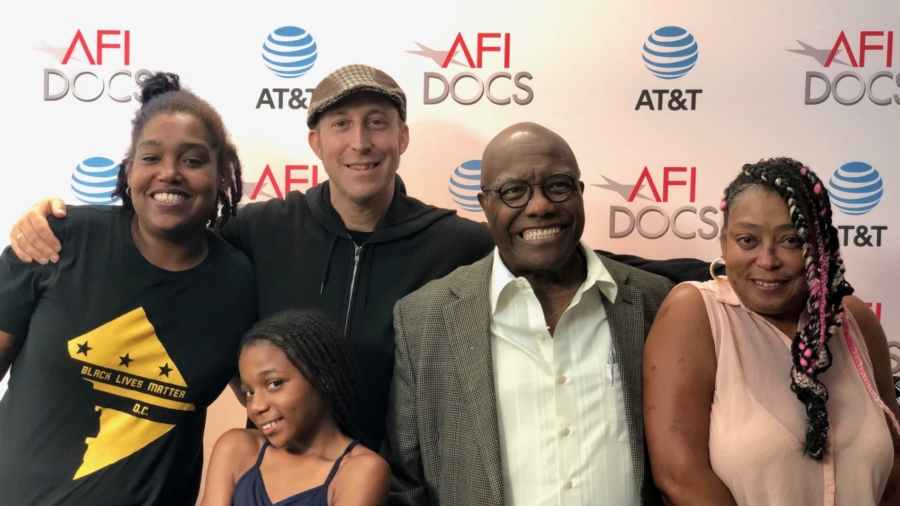Despite being often overlooked or written off as boring, documentary films hold the extraordinary power to capture reality and tell it back to us like a story. Advocating for justice, celebrating progress, and highlighting our triumphs and failures, documentaries tell the stories you just can’t make up. This year’s AFI DOCS film festival in Washington DC, sought, as it does every year, to celebrate that extraordinary power by showcasing some of the best films of the year in the genre. I was fortunate enough to be a member of the audience.
The first evening saw me attending the opening night screening and gala at the National Archives. One of the best parts of any festival in the nation’s capital is the multitude of grand spaces available for events. This evening took place at the National Archives with the reception being held in the rotunda where the Declaration of Independence and the Constitution are housed. The film, True Justice: Bryan Stevenson’s Fight for Justice was a perfect opening choice for a festival in socially conscious Washington. Afterwards, Mr. Stevenson took the stage to be interviewed by Morgan Kelly Radford of NBC News. The reception following kicked off the festival in grand style, transforming the rotunda into a lovely space complete with dramatic lighting and delicious hors d’oeuvres and desserts.
Thursday morning I woke up early to catch a Metro downtown in time for the first filmmaker forum of the day. Probably one of the festival events I was most excited for, this forum focused on women in documentary film. Thank you to Linda Goldstein Knowlton, Waad al-Kateab, Nicole London, Emily Taguchi, Trisha Ziff, and moderator Sarah Harris for a fantastic hour of conversation. After a brief break for coffee and networking, we all filed back into the conference room for the second forum of the morning. I also had been looking forward to this one, although I think I was in the minority. Michael Ehrenzweig was presenting on independent film budgeting, and when he asked the audience who really enjoyed budgeting, my hand was one of perhaps 2 or 3 that were raised. The presentation was an engaging summary of how to create a viable budget, and the audience questions at the end were extremely informative, as people were asking questions specific to their own productions that took us down into the weeds of film finance. After a morning of forums, we all headed for lunch, catered by Shouk, a local restaurant. If you are in DC and looking for incredible vegan shawarma and falafel, this is the place to go. My mushroom shawarma pita was delicious.
Leaving the festival hub, I made the short walk to the Landmark E St. Cinema, one of the festival’s two screening locations, for an afternoon of watching some of the incredible films at this festival. I first saw For Sama, a devastating look at the crisis in Syria from the perspective of a Syrian journalist, Waad al-Kateab, who was attempting to raise a family and win a revolution at the same time. This film is told from the unique perspective of a person who lived through every day of the five-year revolution in Aleppo and was constantly shooting footage of everyday events. The film is full of painful and sometimes horrifying moments that simultaneously accuse and inspire the audience to wonder how nobody in the world could have decided to help the besieged fighters over the course of five years of being bombed and murdered. Waad and her family were some of the very last to leave the city and are now living as exiles in London. It is a film that I believe everyone should watch, difficult as it may be.
I walked out of For Sama wondering a bit how I was going to watch another documentary. It is a wonderful and terrible fact that documentaries, which open windows into parts of the world you might never have seen otherwise, take a lot out of a person. Fortunately, the second documentary I watched that evening was equally spectacular. Directed by bestselling author Davy Rothbart, 17 Blocks tells the story of a family living in Southeast DC, a neglected area that suffers from crime and gun violence, but is only 17 blocks from the US Capitol building. The family “adopted” Rothbart as a young man right out of college just as he was figuring out how to use his first video camera, and the result is years of footage of the everyday life of the family. Ten years into this endeavor, tragedy struck and the film evolved into a more directed project with the goal of telling the story of the families that live so close to the United States’ seat of power, but whose voices are so often overlooked. The home video verité style of the film draws the viewer in, and it is impossible not to fall in love with the family and root for them as they grow up. The film hit especially home here in the nation’s capital, a city with a marble façade, built to impress but just as susceptible to the demons that haunt less fortunate communities in any major urban area.
On Friday, I made good on my promise to the wonderful Linda Goldstein-Knowlton, director of We are the Radical Monarchs, and attended her screening, one I had been excited about since I saw it in the festival program. As a lifelong Girl Scout, I was intrigued by the idea of a similar program for girls of color that focuses solely on social justice issues and celebrating cultural uniqueness. The film did not disappoint and was an uplifting counterbalance to the dark fare of the day before. The story of an organization out to change the world for the better, engagingly told through the perspective of the girls and leaders who started the Radical Monarchs, added a ray of optimism to the serious topic of social justice. After the screening I was back on the Metro, this time heading for Silver Spring. Perhaps my only complaint about AFI DOCS is the distance involved between the two screening venues. The festival hub and the Landmark are in the heart of DC, an ideal central location for the festival, but the AFI Silver, where the festival originated, is located outside the city in suburban Maryland, a distance that any local resident can tell you is fraught with traffic at the best of times. Metro thus being my option, I arrived at the Silver in time for Laurel Channel to interview Mr. Rothbart, the director of 17 Blocks, and Ms. Cheryl Sanford, the mother of the family who were brave enough to share their story in his documentary.
Saturday saw me at the Landmark for another interview, this time with Nicole London, producer of Miles Davis: Birth of the Cool, and then out to the AFI Silver again to catch Shorts Program 5, a collection of six short documentaries selected for the festival. While all six were amazing, my favorite was Mack Wrestles, and told the story of a young transgender man who has been in the news for being forced to wrestle against girls in high school because of a Texas law that requires high school athletes to compete against the gender they were assigned at birth. I was especially struck by the filmmakers’ portrayal of Mack’s grandmother, who has been an outspoken supporter of her grandson and his struggle against the legislature. As an older woman from Texas, it would be easy to assume that she would have a certain perspective on transgender rights. However, she is a strong statement in favor of the idea that not everybody fits into the boxes one might assume they do. This statement becomes even more powerful in the last minutes of the short with a brilliant twist ending.
On the final day of the festival, I attended the closing screening, a documentary about the life of political columnist Molly Ivins. The film explored the power of free speech while celebrating the extraordinary life of one of the few print journalists of recent history to become nationally famous. Full of footage from the multitude of interviews and speeches Ms. Ivins gave throughout her life, the film affectionately captures her talent for humor as it emphasizes the power of her voice. As a closing statement for the festival, it was an excellent choice, encouraging viewers to get out into the world and change it for the better. It can be hard to make the choice to experience reality over a fictional adventure. But AFI DOCS proudly states to everyone who will listen that you really can’t make this stuff up.


Add a Comment